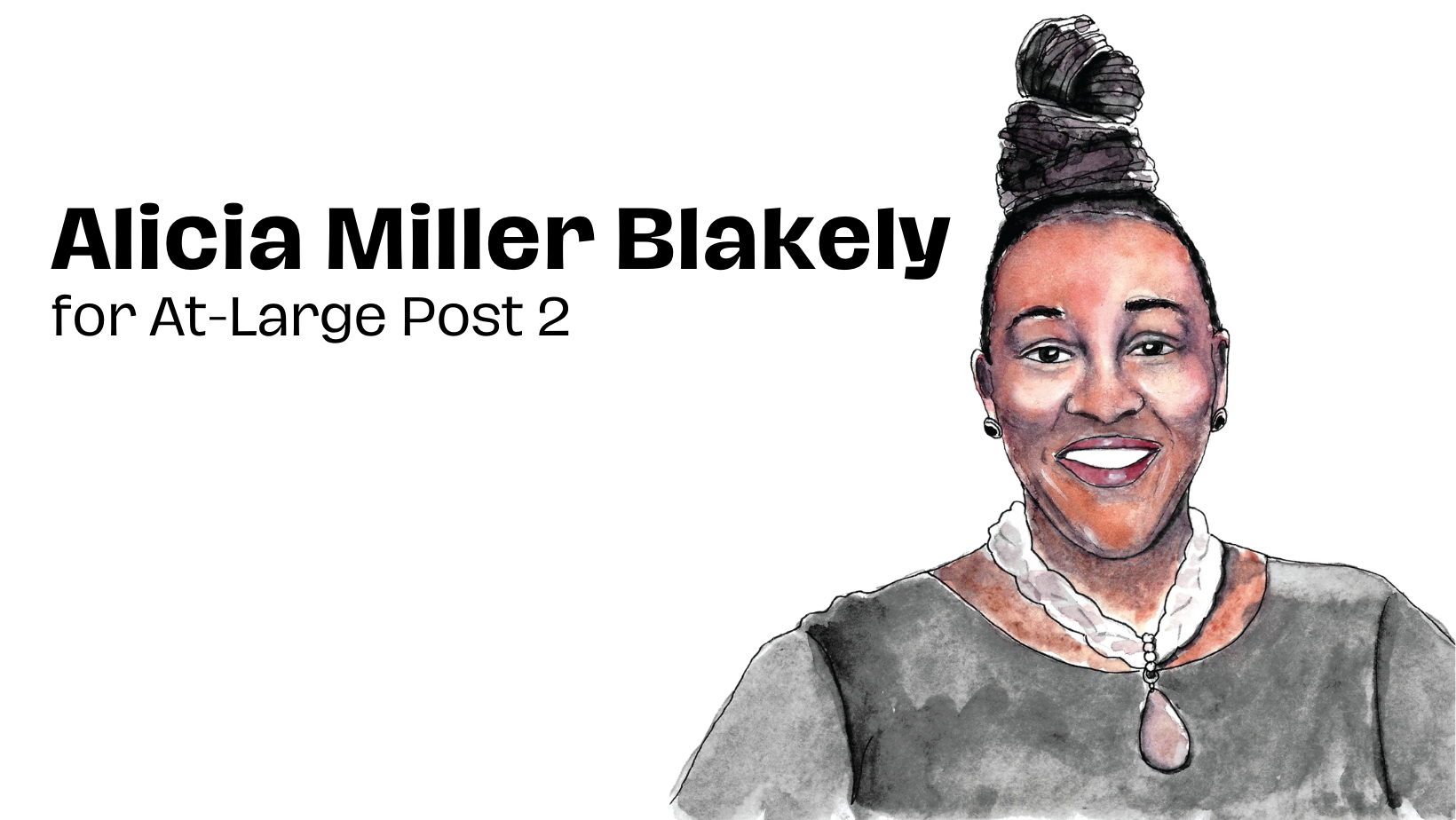By Nell Shellman | Illustration by Jenn Carroll
RAIN WAS misting when Alicia Miller Blakely, alderwoman serving At-Large Post 2, met me under the trees outside Southwest Chatham Library with a granddaughter trailing her and mosquitoes bouncing off her long sleeves.
“I'm a grandmother, a mother and a great grandmother with 29 grandchildren, one great grandchild,” she said, stressing her values. “I've been in the fight and struggle for a mighty long time for justice and equality. I'm a warrior. I'm not afraid to say the things that other people only talk about behind closed doors.”
That talk has been the talk of the race. With other candidates including her opponent Pat Rossiter calling for what they refer to as decorum, it’s clear she is in the crosshairs of other people running for office.
However, Blakely’s rebuttal is clear and blunt: she says she is serving communities that have been sidelined for decades.
“Call me uncivil or whatever the case may be. But it's like you want us to have decorum and dignity while our stomachs are touching our backs.”
Her blunt attitude comes after years of service that didn’t start at City Hall.
“What drives me to serve is the fact that after being in the military, coming home, looking around our city and seeing the disparity in certain communities, I recognized and realized that something was wrong.”
After being hospitalized in an accident at the port while working in the hold of a ship as a longshoreman with ILA Local 1414, she said she wanted to become a voice for the voiceless. That realization led Miller Blakely to found the Bullhorn Crew, a group dedicated to educating people about gun violence.
She eventually passed the organization off to Shawntray “Puff” Grant, who lost his life in a 2018 shooting. The group was the first in a series of organizations she associated with advocacy.
“When I looked around the city, I saw that there were no resources in certain marginalized areas,” she said. “They weren't there because of political will.”
After becoming involved with Al Sharpton’s National Action Network, Miller Blakely ran for At-Large Post 2 and won. Once in office, her experience with the port highlighted to her how the growth people talk about can miss the communities that it is supposed to benefit.
While other candidates talk about their hopes for benefits from the Hyundai plant or port expansion, Miller Blakely talks about the lessons she learned from how people responded to the growth of GPA.
“I understand the growth that's coming. I recognize it. But I don't get excited about all of this growth,” she said, overlooking the park as the rain cleared. “And when I see communities that are suffering, right at the front door of the ports, I have an issue.
“Why aren’t we giving those individuals that live in those areas the things that they need to prevent the pollutants that the port is putting in that area? You know, why aren't we helping those individuals? The port is a billion dollar industry. But think about this. Why can't the port give to those poor and impoverished communities in our first district?”
This idea that growth needs to be equitable is at the heart of her policy decisions, including Miller Blakely’s opposition to TSPLOST. She says the projects were not clear in terms of how the money spent would actually benefit the communities it was being spent in.
“So why do you want me to pay into a system where my community is not reaping the benefits of the TSPLOST? So if my community and the people that I represent are not going to get any of this, then why are we doing it? Give us some set goals. Let us know exactly where this money and these resources are going to be split,” she elaborated.
“They could not tell me that, and that's why I fought against TSPLOST.”
This concern about how things hit the community where they live also informs her view of housing. Miller Blakely said discussing affordable housing isn’t enough—the city needs income-based housing.
“I think that the words ‘affordable’ and ‘workforce housing’ are a play on words. The reason I say that is because we're in a city in some areas that experience three times higher than the national average for poverty. West Savannah is an area in the city that is so impoverished.
Miller Blakely warned that the way the city develops housing now is unsustainable. Her opponent in the At-Large Post 2 race, Pat Rossiter, has specifically said the answer to the housing crisis is in homeownership, but Miller Blakely disagrees.
“You know, with people here in the city, you got the working poor here. So when you come with a house that you say is $250,000, who in the hell can afford it? You understand, especially when you make it $15 an hour now. Our city government, we had to fight to get the people to $15 an hour. For $15 an hour, honey, you're not gonna be able to afford a house where you got to pay $1,400 a month,” she said, leaning across the bench.
“I look at what we're dealing with here in Savannah with gentrification and forced displacement. We're going to be like Charleston, South Carolina, or Hilton Head, South Carolina, in a minute if we don't get a hold of it.”
“Tuesday before last, I was on the courthouse steps with people buying properties—properties where the taxes were like $499. You know, they go in, they buy these properties, they renovate these properties, and when they renovate the properties, the properties are now $250-$300,000. So the people who are in that area, they're not even going to be able to stay there because they can't afford it. So don't come to me with ‘affordable.’ Come to me with income-based, and let's have a conversation. Even those people that live in those apartments that's currently there, they're being displaced—they're being forced out.”
According to Miller Blakely, there is a role for SCAD in paying for all of this as well.
“SCAD needs to do something in lieu of taxes,” she said referring to a proposed PILOT, or payment in lieu of taxes, program.
“They always say that SCAD is doing this, SCAD’s doing that. Okay. They revitalize downtown and what have you, but you have 160 plus buildings that SCAD owns. I think about 34 or 35 of them, they don't pay taxes on," she says.
"Other places like Harvard, you know, they don't have to pay taxes, but doggone it, they at least have the discussion, and they're doing something as a payment in lieu of taxes. You understand? So why can't SCAD do something like that?”
“But if they're not going to do a payment in lieu of taxes, then you don't have to use our police services. You don't have to use our fire services. You don't have to use the amenities that the city offers. You know, give us something back. Heck, give us a whole bunch of scholarships for students here in the city.”
Miller Blakely is aware that her vocal criticism of policies over what happens with the wealth of Savannah has made her a target, but she said that what others see as incivility she sees as necessary, and she takes inspiration on this particular matter from scripture.
“Christ went in the temple and turned the tables over because of the corruption. Our electorate has been more engaged in the political process than ever in the history of City Council,” she said after citing chapter and verse. “Now, if you don't speak up, speak out, ask the tough questions, get engaged, get involved, if you allow things to be the way that they have been for so many, many years, then you don't get anything but what you've been getting.”
“Give me drama and disruption—and resources,” she added.
Miller Blakely pointed out in a city where all different groups of people have hands on various economic drivers, impoverished African American communities still get the short end of the stick.
“In a city, Nell, where we are as African Americans 59.3% of the population, I want you to tell me, what do we have? What do African Americans have in terms of a major economic driver after African American leadership for almost three decades?”
The question was not simply rhetorical, and she affirmed after I answered that the communities in need didn’t have any such drivers.
While Miller Blakely sees herself as a check on inequitable growth, she believes, she notes that putting in place equitable measures is difficult because she cannot get her measures on the agenda. Miller Blakely said that if she could put one thing on the agenda, it would literally be to change the rules for getting material on the agenda so they could discuss them. Particularly, she would change the rules of council to allow for three supporters instead of five to get an item on the agenda.
“That's the first thing I would put on that agenda, so that it would be equitable for all of our citizenry to be represented. That is a form of voter suppression when you are elected by people but you can't actually speak for the people.”
Like our City Council election coverage? Help us do more of this kind of work by making a donation.

